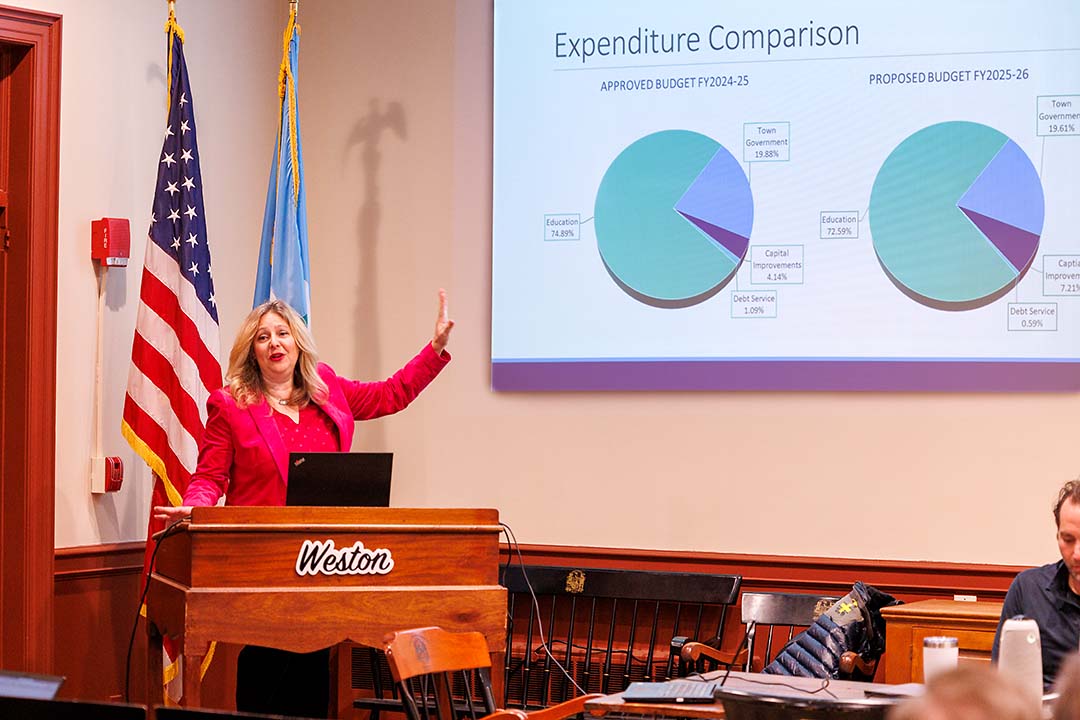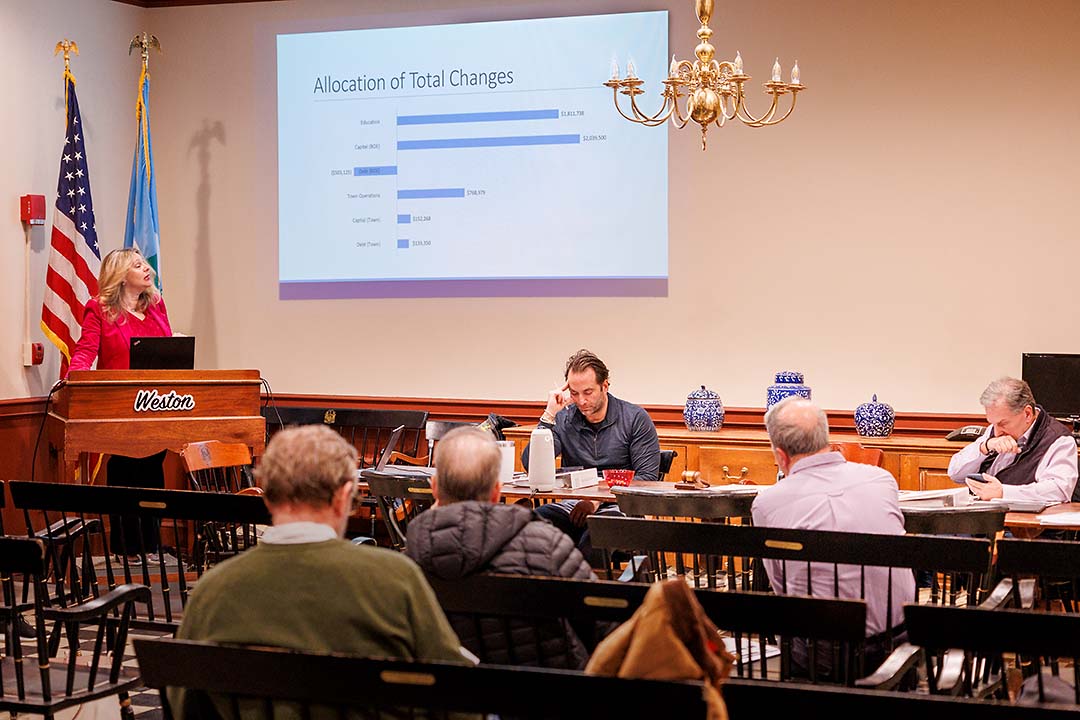Town Budget Proposed, Not Recommended

Weston Today photos
First Selectwoman Samantha Nestor submitted proposed Town operating and capital budgets to the selectmen on February 4, noting from the start that she was not recommending their adoption.
Ms. Nestor said she had already reduced departmental requests by $1.4 million ($1 million of it from capital items), making “difficult decisions … to balance fiscal reality with budget requests.”
“I think there are more cuts we can make,” said Ms. Nestor, deeming them policy decisions that should be made collaboratively with the two selectmen and with the Board of Education.
The operating budget voted by the Board of Education is $61,151,439. As presented, the Town budget for operations would be $16,518,976. Capital expenditures put forth by the Town and school board add up to over $6.1 million, an historically high total that seems unlikely to survive.
At those levels, Ms. Nestor said the mill rate would increase 5.37 percent to 24.73 mills (thousands of a dollar). As an example, the tax on a $1.2 million home (assessed value $840,000) would go up $1,058 a year, or roughly $88 per month.
“We can do better,” said Ms. Nestor. “But we must be mindful of what we can and can’t control.”
Town operations
As it stands, the first selectwoman’s proposed budget for Town operations rises $768,979 from the current year, up 4.88 percent.
One positive effect for the budget is growth in the Grand List, which increased by one percent this year, about twice what was expected. But other factors drive up costs, some inevitably so.
Ms. Nestor said the cost of health insurance will increase by 11 percent, which, combined with a contingency for wage increases expected in upcoming labor negotiations, will add about half a million to operating costs. Nearly $150,000 is added for non-optional increases to Weston’s share of the Georgetown Fire District, a state mandate to provide firefighters with PFAS-free gear, maintenance of water supply PFAS filtration, and the mandatory pension fund contribution.
Ms. Nestor said the budget started in the hole after funds were cut last year for Public Works operations, including street sweeping, salt, catch basin cleaning, and snow removal overtime. The proposed budget restores those funds to their baselines and again calls for adding a DPW position, a facilities maintainer.
The first selectwoman said the Town has $1.1 million worth of deferred maintenance needs and no one to perform them. Citing as an example the long-neglected Town-owned house at the entrance of Morehouse Park, she said, “Moving forward, we need to keep buildings from getting to this state of disrepair.”
The revenue side
Although the Grand List has grown, other revenue sources have diminished. Ms. Nestor said lower interest rates will produce lower returns on the Town’s investments, and state aid will be down by about 14 percent, a reduction of more than $111,000.
Weston’s mill rate is now lower than the state cap on vehicle taxes, so the Town no longer qualifies for reimbursement of the differential. A change in depreciation also has a negative effect. And, the state budget proposed last week by Governor Ned Lamont foretells a slight decrease in Weston’s Educational Cost Sharing (ECS) grant.
Ms. Nestor’s budget proposes “moderating the mill rate” a bit by taking 20 percent of interest currently earned by the Town’s reserve fund investments — $300,000 — and treating it as revenue. Many towns do this, she said, “as a way to give money back to taxpayers that was overestimated.” She pointed out that Weston’s current fund balance is 23 percent of expenditures, one of best ratios around, and above the Board of Finance target of 20 percent.
Capital projects
Significant items on the $2.8 million list of Town capital expenditures include nearly $200,000 to replace worn out police vehicles and to bring laptops in cruisers into compliance with state requirements. $60,000 is designated for installation of rooftop solar panels at Lachat Town Farm.
Nearly $110,000 is allocated to the library to match a state grant for a generator and an air handler. $150,000 goes toward preliminary engineering and matching funds related to a Small Town Economic Assistance Program (STEAP) grant application.
$250,000 is socked away for road paving that may be needed beyond the current two-year plan, already financed. (Funds are also allocated in the operating budget for preventive road maintenance, such as crack sealing, a new provision that will be one of those policy discussions.)
The largest items are $500,000 toward the planned replacement of a fire truck, and nearly the same amount for Public Works equipment: a plow truck, dump truck with sander, and a pickup truck.
Just over $800,000 is budgeted for deferred repairs and maintenance of buildings at the Public Works facility, the transfer station, and buildings on the Town campus.
Ms. Nestor said the Town is already three years late on its capital improvement plan and that only about $220,000 of projects on her list go to forward-looking projects, which include technology to improve services and reduce energy costs. 92 percent of the projects, she said, are for previously deferred maintenance.
On School Road …
Further to the subject of deferred projects, Ms. Nestor said at least one particular Board of Education capital request will need deep discussion: replacement of HVAC at Hurlbutt Elementary’s North House. An estimate arrived late in the budget cycle, coming in at $1.75 million, driving up the school board’s capital total to $3.3 million.
Ms. Nestor said she sympathized with the request, because the need had been known back when she and Selectman Tony Pesco were on the school board. Ms. Nestor became a member in 2017.
The question on these matters, she said, is “how far are we going to kick the can?” She said the difficulty is that “in the end we don’t know what will be done with Hurlbutt and the middle school.”
Selectman Kerem Dinlenc said, “the campus project is the opportunity to embrace or acknowledge the long-term trajectory of the schools.” Ms. Nestor agreed, saying, “the school building project looms over the budget.”
“On the Town side,” said Ms. Nestor, “we know what we need over the next ten years. We need that from the BOE.”
Dr. Pesco said, “The capital budgets are going to require a big discussion. The number is large, and I think the number needs to be reduced.”
“We used to push things out,” he said. “Have we piled up projects over the next two or three years already? It’s important to see if this is an anomaly or if we have so much ahead of us we’re faced with a new cost regime.”

